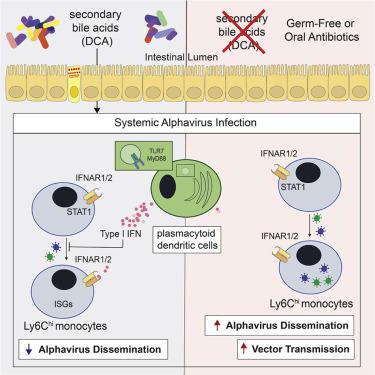Cell ( IF 45.5 ) Pub Date : 2020-07-14 , DOI: 10.1016/j.cell.2020.06.029 Emma S Winkler 1 , Swathi Shrihari 2 , Barry L Hykes 3 , Scott A Handley 3 , Prabhakar S Andhey 4 , Yan-Jang S Huang 5 , Amanda Swain 4 , Lindsay Droit 3 , Kranthi K Chebrolu 6 , Matthias Mack 7 , Dana L Vanlandingham 5 , Larissa B Thackray 2 , Marina Cella 4 , Marco Colonna 4 , Maxim N Artyomov 4 , Thaddeus S Stappenbeck 8 , Michael S Diamond 9

|
Chikungunya virus (CHIKV), an emerging alphavirus, has infected millions of people. However, the factors modulating disease outcome remain poorly understood. Here, we show in germ-free mice or in oral antibiotic-treated conventionally housed mice with depleted intestinal microbiomes that greater CHIKV infection and spread occurs within 1 day of virus inoculation. Alteration of the microbiome alters TLR7-MyD88 signaling in plasmacytoid dendritic cells (pDCs) and blunts systemic production of type I interferon (IFN). Consequently, circulating monocytes express fewer IFN-stimulated genes and become permissive for CHIKV infection. Reconstitution with a single bacterial species, Clostridium scindens, or its derived metabolite, the secondary bile acid deoxycholic acid, can restore pDC- and MyD88-dependent type I IFN responses to restrict systemic CHIKV infection and transmission back to vector mosquitoes. Thus, symbiotic intestinal bacteria modulate antiviral immunity and levels of circulating alphaviruses within hours of infection through a bile acid-pDC-IFN signaling axis, which affects viremia, dissemination, and potentially transmission.
中文翻译:

肠道微生物组通过胆汁酸 I 型干扰素信号轴限制甲病毒感染和传播。
基孔肯雅病毒 (CHIKV) 是一种新兴的甲病毒,已感染数百万人。然而,调节疾病结果的因素仍然知之甚少。在这里,我们在无菌小鼠或口服抗生素治疗的常规饲养小鼠中显示肠道微生物组耗尽,在病毒接种后 1 天内发生更大的 CHIKV 感染和传播。微生物组的改变会改变浆细胞样树突细胞 (pDC) 中的 TLR7-MyD88 信号传导并减弱 I 型干扰素 (IFN) 的全身性产生。因此,循环中的单核细胞表达较少的 IFN 刺激基因,并允许 CHIKV 感染。用单一细菌物种重新配制,Clostridium scindens,或其衍生代谢物,次级胆汁酸脱氧胆酸,可以恢复 pDC 和 MyD88 依赖性 I 型干扰素反应,以限制全身 CHIKV 感染和传播回媒介蚊子。因此,共生肠道细菌在感染后数小时内通过胆汁酸-pDC-IFN 信号轴调节抗病毒免疫和循环甲病毒的水平,从而影响病毒血症、传播和潜在传播。











































 京公网安备 11010802027423号
京公网安备 11010802027423号